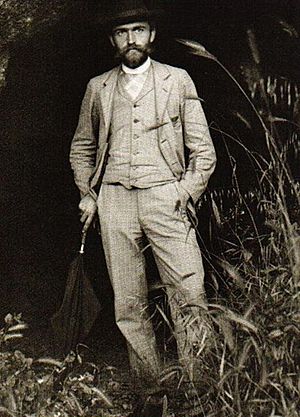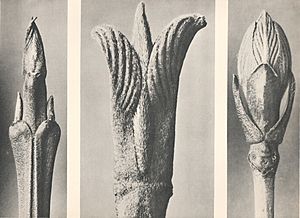Karl Blossfeldt facts for kids
Karl Blossfeldt (born June 13, 1865 – died December 9, 1932) was a German photographer and sculptor. He is most famous for his amazing close-up photos of plants. These photos were published in 1929 in a book called Urformen der Kunst, which means "Art Forms in Nature."
Karl was inspired by nature, just like his father. He believed that plants were not just living things, but also beautiful works of art and design. He thought plants had their own unique "artistic and architectural structure."
Karl Blossfeldt taught at the Berlin Arts and Crafts School. Later, he became a professor at the United State Schools for Fine and Applied Art in Berlin. He passed away when he was 67 years old.
Karl Blossfeldt's Early Life and Work
Karl Blossfeldt never went to a special photography school. Instead, he learned by working with Moritz Meurer, an artist and design professor, in Rome from 1890 to 1896.
In 1898, Karl started teaching at the Institute of Royal Arts Museum. He stayed there until 1931. During this time, he started collecting his photographs to use them for teaching.
Karl even made his own special cameras. These cameras helped him take incredibly detailed, magnified pictures of plant surfaces. He loved finding the repeating patterns and shapes hidden in nature.
Karl Blossfeldt worked in Berlin, Germany.
His Famous Book: Art Forms in Nature
For many years, Blossfeldt's photos were mainly used as teaching tools in Berlin. But in 1929, when he was 63, his first book, Urformen der Kunst (Art Forms in Nature), was published. This book quickly became popular around the world and made Karl Blossfeldt famous almost overnight!
People were amazed by the abstract shapes and structures he showed in nature. Famous thinkers like Walter Benjamin praised his work. He said Blossfeldt helped us see the world in a new way. Even the Surrealists, who were artists interested in dreams and the imagination, loved his images.
In 2001, Urformen der Kunst was named one of the most important photography books of the 20th century.
See also
 In Spanish: Karl Blossfeldt para niños
In Spanish: Karl Blossfeldt para niños
 | Aurelia Browder |
 | Nannie Helen Burroughs |
 | Michelle Alexander |



